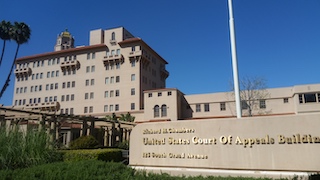The following summary of a U.S. Court of Appeals ruling from the Ninth Circuit in San Francisco, United States v. Tyronne Pollard, Jr., is instructive to our readers on two levels.
First, it explains how a federal court can rule upon a motion to vacate a conviction for being a felon in possession of a firearm in light of the Rehaif v. United States ruling (Rehaif v. United States (2019) 139 S. Ct. 2191).
Second, it unfortunately shows how a judge can evaluate a motion to vacate, which we appreciate as being how a judge in state court may similarly approach a motion to vacate a conviction under California Penal Code § 1473.7(a)(1). Therefore, this article serves as somewhat of a warning and a suggestion that a wise attorney bringing such a state court motion to vacate will anticipate such an opposition and consider his or her response in advance.
Brief Synopsis: In the following case, defendant argued he did not knowingly or intelligently enter into his plea but the transcript of the plea showed defendant completely understand the nature and the consequences of his plea, so his federal motion to withdraw his plea was denied.
In December 2017, Tyronne Pollard, Jr., was indicted for possessing a gun as a felon in violation of 18 U.S.C. § 922(g)(1). As the crime implies, this was not Pollard’s first offense. Over the prior twenty years, he was convicted of several felonies and served over five years in state prison.
His federal felon-in-possession indictment was not his first gun-related offense. In 2004, Pollard was sentenced to over one year in state prison for violating California’s felon-in-possession statute.
So, when federal officers found guns in Pollard’s possession in 2017, the federal government’s allegations were straightforward: Pollard was a felon who knowingly possessed a gun and ammunition that were transported in interstate commerce. Pollard pled guilty and was sentenced to 57 months in federal prison. He did not appeal.
When the district court judge asked him at sentencing whey he was being convicted, Pollard responded, “I possessed a firearm that I was not supposed to have.” The judge then asked Pollard why he was not supposed to have a gun. Pollard responded, “Because I am a felon and my rights have been – didn’t have the right to have it no more.”
A year later, however, the U.S. Supreme Court decided Rehaif, supra, holding that § 922(g)(1) requires the government to prove that defendant knew he was a felon at the time of possession. See generally Rehaif at 139 S. Ct. 2191. Pollard then filed a motion to vacate his conviction and sentence under 28 U.S.C. § 2255(a), contending that his guilty plea was not intelligent, knowing, or voluntary without having been informed of § 922(g)(1)’s knowledge-of-status element.
The U.S. District Court for the Northern District of California assigned to Pollard’s case denied Pollard’s motion because he had not shown actual prejudice and thus failed to overcome the procedurally defaulted nature of his claim.
The grounds of not showing actual prejudice is a reason we increasingly see as a reason a state court will deny a motion to vacate under Penal Code § 1473.7(a)(1).
 Ninth Circuit Court of Appeals Pasadena
Ninth Circuit Court of Appeals Pasadena
Pollard then appealed to the U.S. Court of Appeals for the Ninth Circuit located in San Francisco. The Ninth Circuit affirmed the district court’s denial of the motion to withdraw for multiple reasons.
First, it explained that Pollard’s motion was procedurally barred because he did not appeal his conviction in 2018. Bousley v. United States (1998) 523 U.S. 614, 621. Consequently, Pollard had to show cause why he did not object to or directly appeal the alleged error; and actual prejudice resulting from the error to overcome that default. Id., at 622.
On this issue, the Ninth Circuit offered a recitation of federal law that anyone handling a California state court motion to vacate should appreciate. The Ninth Circuit explained that a petitioner who pled guilty is prejudiced if there is “a reasonable probability that, but for the error, he would not have entered the plea.”
United States v. Dominguez Benitez (2004) 542 U.S. 74, 76. In Addition, a court cannot consider whether a defendant’s decision to go to trial “may have been foolish.”
United States v. Monzon (9th Cir., 2005) 429 F.3d 1268, 1272.
However, the court may consider direct or circumstantial evidence that any error was not prejudicial. In the felon-in-possession context, the court will often consider a person’s criminal history because “if a person is a felon, he ordinarily knows he is a felon.” Greer v. United States (2021) 141 S. Ct. 2090, 2098.
In this case, the plea colloquy between the judge and Pollard conclusively showed he knew exactly what he now claims he did not: that he was a felon and could not possess a gun.
Pollard then asserts that he would have gone to trial if he knew such a knowledge requirement was something the prosecution had to prove for a conviction. The Ninth Circuit acknowledged that in Lee v. United States (2017) 137 S. Ct. 1958, 1963, no matter how difficult trial may seem, it can be a “Hail Mary” that has some chance of success, even if doing so may seem “foolish” to the reasonable defendant. Monzon, at 1272.
However, in this case, there was no showing of any objective reason why going to trial had any chance of success, so Pollard’s appeal was denied.
The citation for the United States Court of Appeals for Ninth Circuit ruling discussed above is United States v. Tyronne Pollard, Jr. (9th Cir, 2021) 10 F. 4th 948.
For more information about 18 U.S.C. § 922(g) (the Rehaif case), please click on the following articles:
 Ninth Circuit Court of Appeals Pasadena
Ninth Circuit Court of Appeals Pasadena